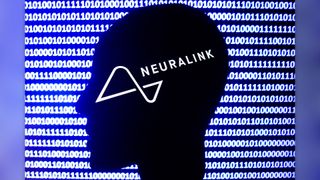
Neuralink’s brain chip has reportedly been implanted into a human for the first time.
(Image credit: Jakub Porzycki/NurPhoto via Getty Images)
The neurotechnology company Neuralink implanted a brain chip into its first human subject on Nov. 28, founder Elon Musk announced on X.
The brain-computer interface (BCI), called Telepathy, is intended to translate a user’s brain signals into information that can be processed by a computer, via Bluetooth. This should allow users to control devices, such as phones, using just their thoughts, the company says.
The device is surgically implanted into a small hole in the skull drilled by a robot, which then places electrode threads in “a region of the brain that controls movement intention,” according to a Sept. 2023 press release from Neuralink.
The initial goal of Neuralink’s in-human trial — which was cleared by the Food and Drug Administration last year — will be to enable participants to control a computer cursor or keyboard with their minds. In his X post, Musk wrote that the trial’s first participant “is recovering well” from surgery, and “initial results show promising neuron spike detection,” meaning the device is presumably picking up the person’s brain signals.
Related: Brain-computer interface helps patient with locked-in syndrome communicate
The company recruited people with quadriplegia, or some level of paralysis that affects their body from the neck down, to participate in the trial, according to a recruitment pamphlet.
Alongside Neuralink, other groups are also testing BCIs to help people with paralysis communicate via devices. So far, the field has shown promise.
Broadly, “the idea of brain-nervous system interfaces has great potential to help people with neurological disorders in future and is an excellent example of how fundamental neuroscience research is being harnessed for medical advances,” Tara Spires-Jones, president of the British Neuroscience Association, said in a statement from the Science Media Centre.
But Neuralink’s journey has been far from smooth sailing. In 2022, the U.S. Department of Agriculture launched a federal probe into Neuralink investigating claims of animal welfare violations during their preclinical brain chip tests. Less than a year later, WIRED revealed that several of Neuralink’s primate subjects had to be put down due to health complications, including one that contracted an infection after a piece of the implant broke off during surgery.
Neuralink isn’t the first company to insert BCIs into human subjects. For example, in 2022, biotechnology company Synchron announced promising trial results for its own implanted device that helps people operate assistive technologies with their thoughts.
Although Neuralink is currently focused on the medical applications of its device, the company wants to eventually broaden the use of the chip. Its goal is “to restore autonomy to those with unmet medical needs today and unlock human potential tomorrow,” according to Neuralink’s website.
Musk even said in 2022 that he would eventually receive the implant himself one day, CNBC reported.
However, some experts are concerned by the ethical implications of using the device for self-enhancement.
“A society where some people are cognitively enhanced and others aren’t could create a class divide like nothing ever,” Allan McCay, a fellow at the University of Sydney’s Law School, told The Washington Post.
Ever wonder why some people build muscle more easily than others or why freckles come out in the sun? Send us your questions about how the human body works to community@livescience.com with the subject line “Health Desk Q,” and you may see your question answered on the website!
Get the world’s most fascinating discoveries delivered straight to your inbox.
Kiley Price is a former Live Science staff writer based in New York City. Her work has appeared in National Geographic, Slate, Mongabay and more. She holds a bachelor’s degree from Wake Forest University, where she studied biology and journalism, and is pursuing a master’s degree at New York University’s Science, Health and Environmental Reporting Program.
>>> Read full article>>>
Copyright for syndicated content belongs to the linked Source : Live Science – https://www.livescience.com/health/neuroscience/neuralink-brain-chip-implanted-into-human-for-the-1st-time-elon-musk-says
